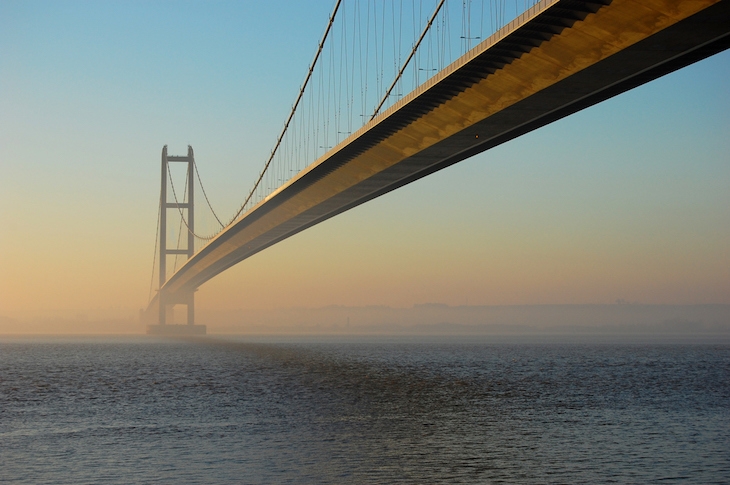I return often to Cambridge and was there recently. Julian Glover, my partner, was talking to the History Society at Trinity about his new biography of Thomas Telford, the 18th-century roads, bridges and canals engineer. We spent the night at Trinity, and I had time to update my acquaintance with this fast-changing city.
‘Fast’ hardly does justice to the speed of change. ‘Silicon Fen’ may be a smart-Alecky sobriquet, but something huge is happening here, something very much of our time. Though the university nucleus remains reassuringly familiar, the river Cam sits at the centre of the biggest and most sustained expansion and boom I’ve ever seen in England. A new railway station, Cambridge North, has appeared in Chesterton, and Cambridge station itself has been passing through convulsive (and impressive) re-development as it struggles to keep up with the cars, taxis, buses, cycles and sheer growing volume of passengers, while huge new buildings mushroom all around. Transport pressures on the city and its surrounds are almost overwhelming; there is a building boom, a house-price boom, huge challenges with parking and access, and dreadful overcrowding on the trains.
It was on one of these overcrowded trains (standing room only all the way to King’s Cross) that Julian and I started talking about plans not only for the Cambridge area, but the whole east-west corridor through Milton Keynes to Oxford, of which Cambridge’s boom is a part. Julian was for three years the principal policy adviser to the transport secretary, and both the reach and the depth of his knowledge of the field are scary. He started mapping out the possibilities to me in his typically bish-bash-bosh way, no ifs or buts, no grey areas, but a powerful starting point for discussion. He began with the university town.
‘The problems getting to the station are ridiculous. So we bury a tramway from the station, running beneath Hills Road and all the way onward through the town and out the other side, skirting but not touching the colleges along the river. Not a complicated project. Deep tunnel. Two years of traffic hell, and it’s done.
‘Then a third rail station, Cambridge South, obviously. Incidentally, the M11 must be extended north to Newcastle using the Humber Bridge as it was designed to be used, and taking pressure off the M1.
‘Meanwhile, we build a new, dedicated express line, possibly via Stansted, direct to Canary Wharf. The Liverpool Street and King’s Cross lines can’t take much more.’
We looked out of the train windows over the mostly dreary, flat country surrounding Cambridge. ‘And this,’ said Julian, ‘should be partly reforested. Telford did a good job draining the fens but the biodiversity of this landscape is abysmal. While we grow a Greater Cambridge of two million or more, why grow turnips all around? We should be ringing the city in woodland and park.
‘Then there’s the new rail link to Oxford. It will interchange with the East Coast, Midland and West Coast main lines, obviously, but it’s vital there’s an interchange with the new HS2. And between Cambridge and Oxford: one entirely new city — or two? It’s for discussion. There’s an Infrastructure Commission report just published. It deserves to be big news.’
The discussion continued as we waited in Royston for more poor would-be passengers struggling to board. Doubtless many readers will take issue in respect of Julian’s impromptu Green Paper, but nobody who has visited Cambridge recently will deny that big thinking is needed. I find this kind of thing tremendously exciting. It was what I went into politics for.
And here we are at Christmas 2017, arguing about Brexit. The foul air is thick with abstract nouns and phrases — ‘sovereignty’, ‘control’, ‘the will of the people’, ‘casting off our shackles’, ‘Article 50’, ‘transition period’, ‘implementation period’, ‘the European yoke’ — and we’re all at each other’s throats. One protagonist questions another’s patriotism; another spews the wartime rhetoric of Winston Churchill; the glories of the past are called in evidence; the promise of the future is cited in huge and vague generality. And there’s not a single brick, not a single blueprint, not a bridge or culvert or tunnel or garden city to be seen in this wretched war of words, which is at the same time viciously overheated yet utterly nebulous.
The whole thing has been beautifully designed for the kind of politician or columnist who couldn’t change a lightbulb, let alone get to grips with a transport plan; they’re in their element, these posturers, when the talk is of destiny rather than drains. If you consider the real domestic problem-solving that our challenging epoch calls for, this damned European thing is notable not just for the level of noise, but for its flimsiness. Look at the Infrastructure Commission’s interim report: ‘Maximising the potential of the Cambridge-Milton Keynes-Oxford corridor as a single, knowledge-intensive cluster.’ Its dramatis personae are solid: houses, steel, concrete and greenery. Look at the Brexit debate and you encounter only wraiths.
And while we’re all shouting at each other about Brexit, time and attention are diverted from the questions we should be answering for the next generation. Whether in the end we leave or stay in the European Union, the sheer opportunity cost of this stupid distraction will be counted not least among the harms inflicted on the better part of a decade of our political history.
I’m as guilty as the rest. I rage in print and broadcast against the folly of Brexit. Like a sore tooth, I just can’t leave it alone. Nor shall I, in the year ahead. I’ve learned my lesson from the Eurosceptic obsessives: never give in. But while we bang on — we on both sides — perhaps we might pause for a moment over Christmas and remind ourselves that the actual business of governing Britain awaits our interest, and our return.







Comments